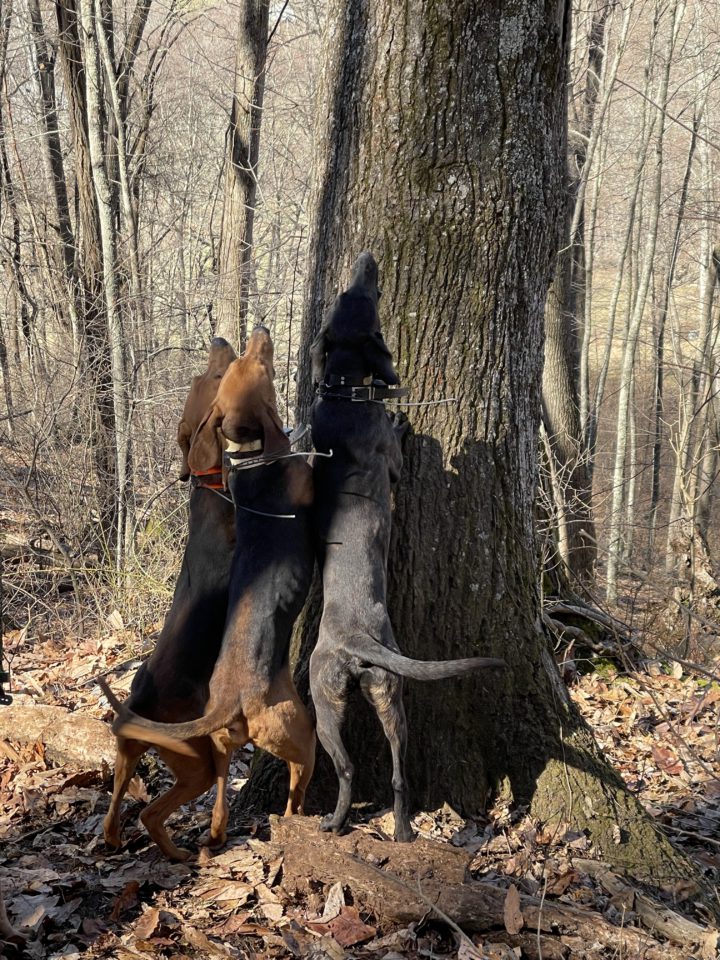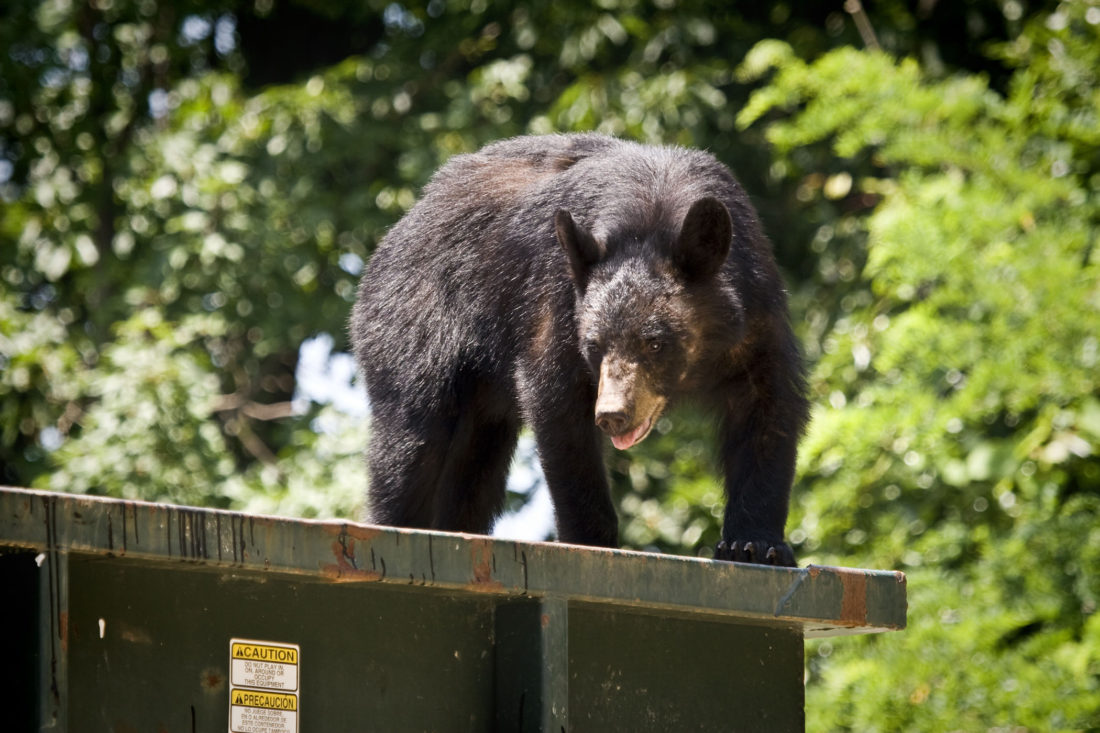On Feb. 4, the N.C. Wildlife Resources Commission approved a rule change regarding the state’s most famous animal: the black bear.
The rule change altered the name of the state’s 22 “designated bear sanctuaries” to “designated bear management units,” and allowed hunting bears with a permit at Panthertown-Bonas Defeat, Standing Indian and Pisgah Designated Bear Management Units.
Regulated hunting is a component of the NCWRC’s 2012-22 Black Bear Management Plan. North Carolina is home to 17,000 to 20,000 black bears, according to BearWise, an educational organization about living responsibly alongside bears.
In 2020, hunters reported killing 3,748 bears statewide, according to an NCWRC report compiled by Colleen Olfenbuttel, black bear and furbearer biologist for the NCWRC’s Wildlife Management Division. The area designated the Mountain Bear Management Unit, which comprises Western North Carolina, reported 1,429 bears killed.
According to a NCWRC fact sheet provided to Xpress, permitting hunting in the three areas will “[address] local human-bear conflicts by locally managing bear densities, removing problem bears and reversing human-conditioned behavior being observed in local bears.”
“We’re seeing an annual 5-6% increase of the bear population in the mountains,” says Justin McVey, Western North Carolina’s wildlife management biologist for NCWRC, whose region includes the former sanctuaries where hunting will be allowed. “We’re really happy with how many bears we have. They’re healthy. And we don’t really need any more bear growth.”
However, critics of the NCWRC’s rule change dispute that the bear population is growing uncontrollably. And they particularly oppose one of the hunting methods: using dogs to chase a bear to corner the animal, or chase it up a tree, and then it is shot.
“To me it’s not a hunting issue — it’s a cruelty issue,” says Bill Lea, a retired U.S. Forest Service employee and photographer of black bears. “I probably wouldn’t fight it nearly as much if they were hunted in a more ethical manner.”
Thrill of the hunt
Taylor Frizsell of Black Mountain began hunting as a child with his father. Today he owns 13 dogs, mostly Plott hounds, for hunting black bears on both public and private lands.
He likes to hunt large male bears — “300-plus” pounds, he says. “Our dogs are taught to stay back and bay, which [means] stay within a couple feet and try to keep [the bear] at bay until we can get there and assess what they’ve got,” he says. People who think hound hunting is cruel are “misinformed,” he says.
“Cruel is not a word that I associate with bear hunting,” Frizsell continues. “As far as what we consider ‘fair chase,’ you’re giving the bear an opportunity to be natural, to run from a predator. And the dogs are a tenth of the size of most of the bears they run. They’ve got heart to be able to pursue them and actually catch them.”
He eats the bear meat himself — “you can do spaghetti, hamburgers” — and gifts it to landowners who let him hunt on their property.
As for hunting in the three newly opened areas, Frizsell says, “It’s crossed my mind.”
Bear necessities
In 1971, the NCWRC established 28 bear sanctuaries across 800,000 acres in the state to protect breeding female bears. Sanctuary space has decreased over time, and there are currently fewer than 500,000 acres of protected land for bears.
Black bears are typically afraid of humans, says Lea. They also prefer to find food in the easiest way possible. Their diet is meant to be berries, insects and carrion (dead animals), according to Bearwise.
But the lure of campsite treats or a trash can of delicious garbage — “anthropogenic food sources,” McVey explains — is too tempting. Black bears can become so habituated to humans that they lose their fear — which poses danger to humans, pets and the bears themselves.
Black bears have cubs every other year, and the number of cubs varies based on food availability. Two or three cubs per litter is common. But bears in Asheville can have as many as five cubs per litter, given the availability of anthropogenic food sources, McVey explains.
“We used to consider ourselves lucky hunters when we seen three to four cubs with a bear — you went back and told your buddies about it,” says Frizsell, the hunter. “And now it seems like every [female] bear you see has three to four cubs.”
But opponents of the NCWRC’s rule change, like Rosemary Jackson, a bear biologist who lives near Standing Indian Bear Sanctuary, maintain the black bear population is self-regulating.
“The Western NC bear population is naturally regulated by food availability, specifically mast [plant] abundance, so it is not necessary to hunt bears,” Jackson wrote in an email to Xpress. “Wildlife agencies try to regulate the bear population to fulfill management objectives. Instead of managing bear numbers, we need to manage human behavior.”
Wildlife management
Bear hunts in the designated bear management units will only be allowed with a permit, and limited permits will be available. “The commission is currently evaluating each designated bear management area to determine the permit allocation, including the number of permits that will be issued, number of hunts that will be allowed, and the days those hunts will be allowed to occur on each area,” Olfenbuttel, NCWRC’s black bear biologist, says in a statement to Xpress.
Both North Carolina residents and nonresidents may apply for permits, Olfenbuttel says.
Bear hunting has a split season — one in mid-October to November and another in mid-December — that varies by region. It’s mandatory for hunters to submit a premolar tooth from a bear to NCWRC for tracking purposes. Hunters can kill one bear per season and “bears under 75 lbs. and females with cubs cannot be harvested,” per regulations.
Permitted hunting methods in the three newly opened areas include firearms, archery (bow and arrow, or crossbow) or dogs and firearms combined, McVey says. Hunting with dogs is prohibited in all or part of 21 North Carolina counties.

Frizsell has hunted throughout the South and says “we catch the most healthy, beautiful-looking bears I’ve ever caught [here],” he explains. “We’ve hunted a lot of places where the bears are malnourished — they’re overpopulated but underhunted.”
Yet opponents of the rule change accuse NCWRC of catering to hunters’ wishes rather than looking out for what’s best for bears. “I say there’s nobody representing the wildlife,” says Lea. “But the bear hunters are certainly well represented by these decisions.” (“The NCWRC is the state agency that is responsible for the conservation of wildlife in NC,” McVey wrote in an email. “Black bears have a phenomenal comeback story in NC thanks to the efforts of the NCWRC.”)
NCWRC has previously permitted hunting in bear sanctuaries. The Daniel Boone Designated Bear Management Unit has allowed hunts since 2009, and the Mount Mitchell Designated Bear Management Unit has allowed hunts since 2006. Both are located in Pisgah National Forest.
Lea is suspicious that bear hunting is still allowed in those areas more than a decade later if hunting was permitted there to control the population. “They’ve opened them and they’ve never closed them,” he claims. “You can give a gift to the bear hunters, but it’s impossible to take the gift back because of the political pressure they will exert.” He worries that the floodgates are now open for bear hunting. “Changing the names of the bear sanctuaries to the ‘special units’ just tells you that it won’t be long before they open the rest of the bear sanctuaries,” he says.
When asked in an email if NCWRC has discussed permitting hunting in the other designated bear management units, or whether Lea’s allegation was speculation, McVey replied that he was “not aware of plans for additional bear hunting opportunities at this time.”
Human-bear conflicts
If there’s one area of common agreement, it’s that humans need to follow the BearWise’s guidance on coexisting with bears: restricting their access to our food.
The U.S. Forest Service recommended additional use of bear boxes in 2018, citing an “increase in close and serious bear encounters in Panthertown, where campers have had to leave campsites and hikers have retreated from a local trail.”
Friends of Panthertown, a nonprofit dedicated to preserving the public backcountry, say the installation of two large bear boxes in the backcountry decreased bear sightings “significantly” in 2020 and 2021. The organization opposed permitting bear hunting in Panthertown-Bonas Defeat.
McVey notes that reducing human-bear interactions isn’t the only reason to permit hunting. Hunting is an alternative to other bear deaths resulting from overpopulation, like disease or roadkills, he says. The latter can “occur when you have too many bears in an area,” he explains.
“We want to curtail the growth before we have those kinds of negative mortalities,” he says.




We have a bear “overpopulation” problem because we have diminished bears’ habitats with overbuilding in the Asheville area. So what do we do? We punish the bears even more by ruthlessly hunting them down. We need to quit taking away their right to exist. The least we can do is regime them not cut them down. I am ashamed to be a part of this problem. Had I understood what was happening, I would not have bought a new home in this area.
Only animals hunt, murder, and eat other animals. It’s cannibalism and it’s disgusting and antiquated. Little boys trying to feel like big men. It’s pathetic.
Is it worse to kill bears by hunting, or leave them to starve to death or get hit by a car?
We’re killing bears and other forms of wildlife every day here in the Asheville area, but whenever anyone wants to save a forest or slow down development, we’re told we’re not progressive or realistic, or that we’re that N-word so many are weary of hearing. The most humane thing we can do in many cases is to hunt ethically. I myself do not hunt, but I allow selective harvesting of deer and turkeys on my property in Buncombe County not far from town.
I have had enough of these bear hunting scoundrel’s!
In my experience with them (many occasions) they do not respect an individuals private property, quiet zones, private drives, posted signs along with their loud little truck noises going up and down the mountain roads. If they wish to hunt bear…get out of the truck and go out in the woods them and hunt! Keep you dogs and yourselves off my POSTED land and causing ruckus with me and my animals.
I earned my “Paradise” and was taught to respects others and their properties. I simply can not stand the disrespect from these people just coming onto my land, disrupting my privacy and getting me and my animals all in an uproar for what? So they all can be on the side of the road discussing who is next to kill that beautiful animal just to kill it? BULLSHEET! There needs to be more consideration towards the land owners rights and harsher penalties for those trespassing and to protect these natural inhabitants as much as we can…PERIOD! Thankyou for reading and sharing. Bluff Mountain area North Carolina